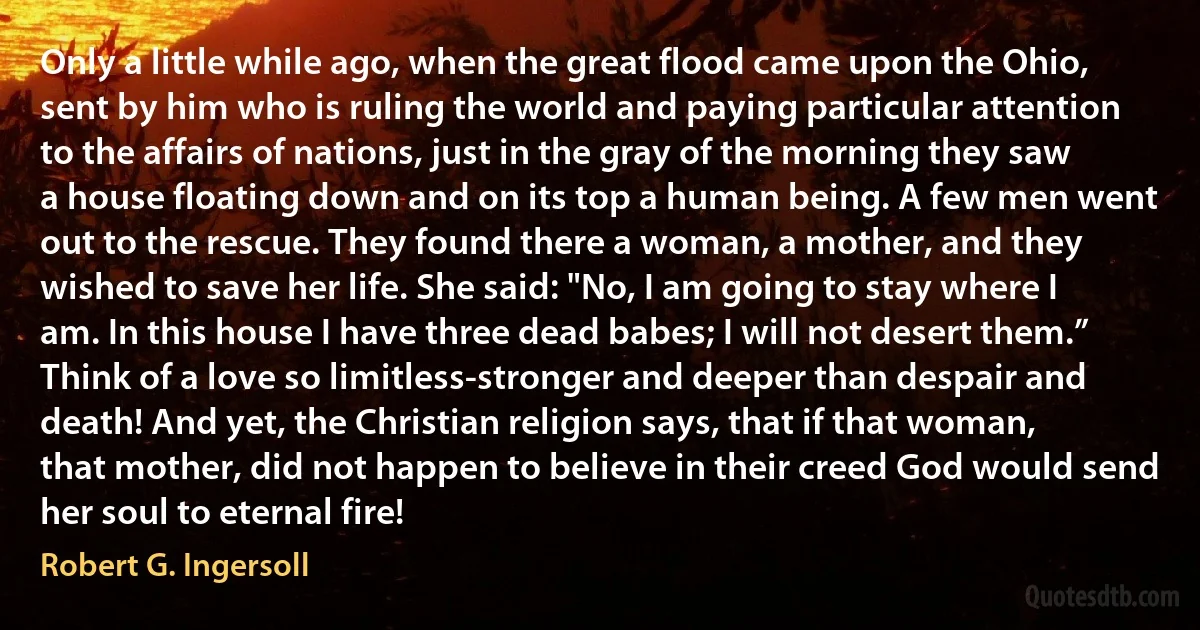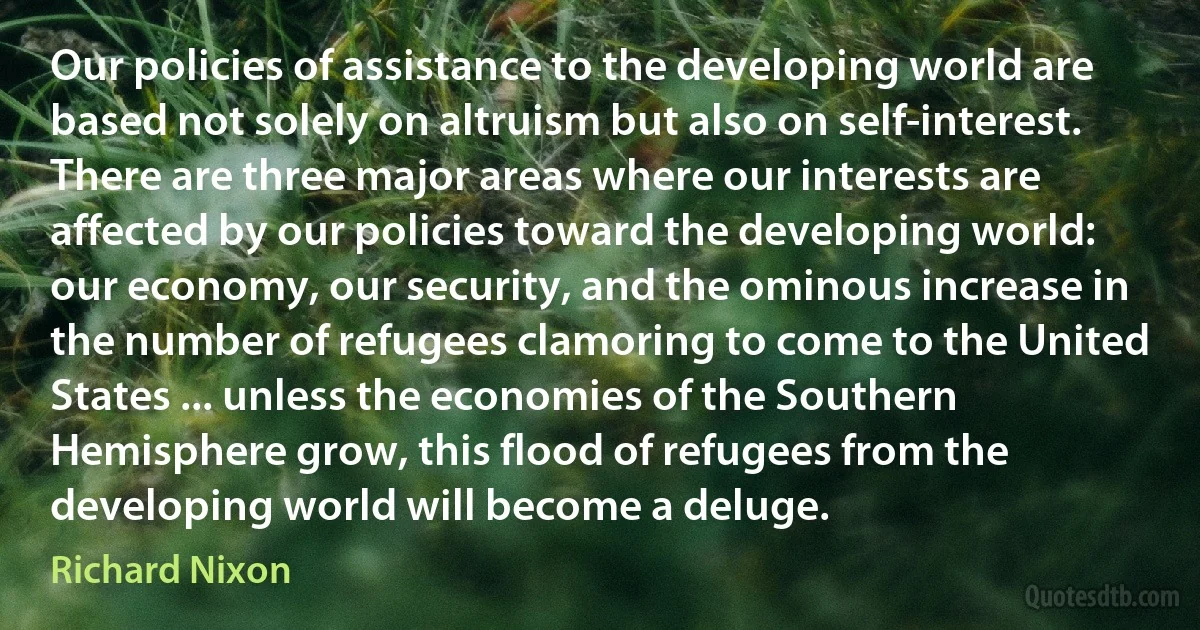Flood Quotes - page 12
By the rude bridge that arched the flood,
Their flag to April's breeze unfurled,
Here once the embattled farmers stood,
And fired the shot heard round the world.The foe long since in silence slept;
Alike the conqueror silent sleeps;
And Time the ruined bridge has swept
Down the dark stream which seaward creeps.On this green bank, by this soft stream,
We set to-day a votive stone;
That memory may their deed redeem,
When, like our sires, our sons are gone.Spirit, that made those heroes dare,
To die, and leave their children free,
Bid Time and Nature gently spare
The shaft we raise to them and thee.

Ralph Waldo Emerson
Does anybody now believe in the story of the serpent? I pity any man or woman who, in this nineteenth century, believes in that childish fable. Why did Adam and Eve disobey? Why, they were tempted. By whom? The devil. Who made the devil? God. What did God make him for? Why did he not tell Adam and Eve about this serpent? Why did he not watch the devil, instead of watching Adam and Eve? Instead of turning them out, why did he not keep him from getting in? Why did he not have his flood first, and drown the devil, before he made a man and woman. And yet, people who call themselves intelligent-professors in colleges and presidents of venerable institutions-teach children and young men that the Garden of Eden story is an absolute historical fact. I defy any man to think of a more childish thing. This God, waiting around Eden-knowing all the while what would happen-having made them on purpose so that it would happen, then does what? Holds all of us responsible, and we were not there.

Robert G. Ingersoll
But the thing that's really disturbing about Noah isn't the silly, it's that it's immoral. It's about a psychotic mass murderer who gets away with it, and his name is God. Genesis says God was so angry with himself for screwing up when he made mankind so flawed (grr!), that he sent the flood to kill everyone. Everyone. Men, women, children, babies. What kind of tyrant punishes everyone just to get back at the few he's mad at? I mean, besides Chris Christie. Hey God, you know you're kind of a dick when you are in a movie with Russell Crowe, and you're the one with anger issues. You know, conservatives are always going on about how Americans are losing their values and their morality. Well, maybe it's because you worship a guy who drowns babies.

Bill Maher
As Hooke declared the favorite hypothesis of the day ('that marine fossil bodies were to be referred to Noah's flood') to be wholly untenable, he appears to have felt himself called upon to substitute a diluvial theory of his own, and thus he became involved in countless difficulties and contradictions. ...When ...he required a former 'crisis of nature' and taught that earthquakes had become debilitated, and that the Alps, Andes, and other chains, had been lifted up in a few months, his machinery was as extravagant and visionary as that of his most fanciful predecessors; and for this reason, perhaps, his whole theory of earthquakes met with undeserved neglect.

Charles Lyell
Shakespeare said: "There comes a tide in the affairs of men which, if taken at the flood, moves on to fortune.” Shakespeare was initiate. He knew all about this, and throughout his works are the answers. The aim is to recognize the window of opportunity, to be so skilled and so in the rhythm of your work, that when it opens, you are there. If there is no rhythm, you could be asleep. If you set a rhythm and never sleep - I do not mean never go to sleep in bed - but if you are not mentally asleep, and do not turn off your consciousness, if you keep your consciousness alive and aware all the time, then when the window of opportunity comes you recognize it because you are in that rhythm. If you are not in the rhythm, you could miss it. This is the importance of rhythm, which of course has nothing to do with time. It is to do with awareness, a rhythmic awareness of setting, not goals, but a pattern of action, so you are always ready, "brush in hand”.

Benjamin Creme
There are ways in which poetry reaches the people who, for one reason or another, are walled off from it. Arriving in diluted forms, serving to point up an episode, to give to a climax an intensity that will carry it without adding heaviness, to travel toward the meaning of a work of graphic art, nevertheless poetry does arrive. And in the socially accepted forms, we may see the response and the fear, expressed without reserve, since they are expressed during enjoyment which has all the sanctions of society.
Close to song, poetry reaches us in the music we admit: the radio songs that flood our homes, the juke-boxes, places where we drink and eat, the songs of work for certain occupations, the stage-songs we hear as ticketed audience.

Muriel Rukeyser


